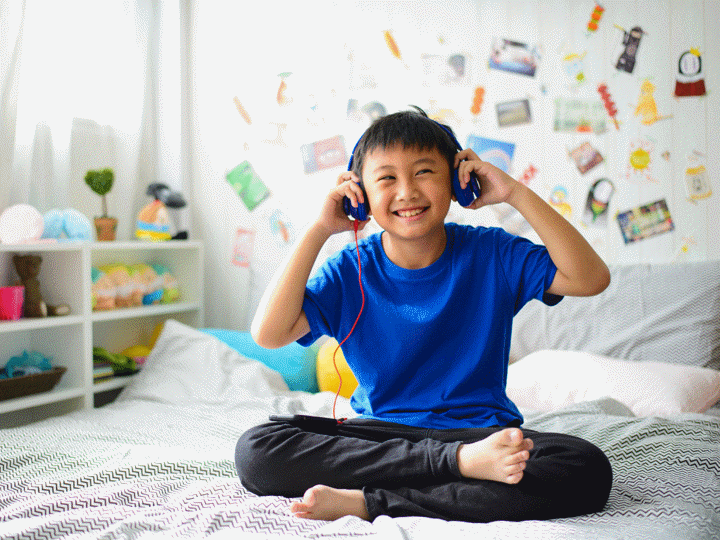Hearing loss and deafness
- 0-1 Years
- 1-5 Years
- 5-11 Years
- 11-19 Years
- Common illnesses
- Speech, language and communication

The term ‘deaf’ is used to describe all levels of hearing loss in children. This includes partial, total or temporary hearing loss (like glue ear).
There are approximately 9 million people in the UK with deafness ranging from mild to profound. Approximately 1 in every 1000 children are born with a severe or profound hearing loss 90% of all deaf children are born to hearing parents.
Explore the topics on this page:
Signs of hearing loss
Sometimes children don’t show any visible signs of irregular hearing loss. However, you may notice:
-
- less babble and smaller range of sounds produced
- changes in behaviour
- increased tiredness and frustration
- not responding when called
- difficulty working out where sound is coming from
- lack of concentration
- preferring to play alone
- sitting close to the TV, or wanting it turned up
- saying ‘what?’ a lot
- speech becoming less clear
- seems quieter
- speaks too quietly or too loudly
Types of deafness
Sensorineural deafness is caused by:
-
- the cochlea in the inner ear not working well
- damage to the hair cells or nerves that detect sound
This type of hearing loss is quite rare and will usually be picked up when baby’s hearing is checked just after they are born.
Conductive deafness is caused by a physical issue. This can be a blockage in the ear such as glue ear. Glue ear is very common in children, especially if they are under 4 years old.
Mixed deafness is caused by a combination of sensorineural and conductive deafness.
Glue ear
Glue ear is when the middle ear (the part behind the eardrum) becomes filled with sticky fluid. 4 out of 5 children will experience glue ear before the age of 10. Children under the age of five mostly commonly experience glue ear but it can carry on into the teenage years.
Glue ear can cause temporary deafness, delayed speech development and affect children’s behaviour and their learning in school. It can often be linked with ear infections and can develop unnoticed. Changes in behaviour, becoming tired and frustrated, lack of concentration, preferring to play alone and not responding when called may indicate glue ear. As a result some children with glue ear are misunderstood or labelled as ‘difficult’.
Download the Hear Glue Ear app to help you manage your child's glue ear at home.
Hearing assessments
Hearing assessments can be done at any age. As your child grows older, the way to access hearing assessment will change.
How to communicate with your deaf child
Remember to keep your child in mind when reading this advice. Every child is different and may need a different approach depending on their needs.
Reducing the noise level at home. If the TV is always on or music is constantly playing, your child may find it hard to hear you over the background noise.
Finding the best way to communicate with your child. This may be sign language or speaking to them, or both.
Being face to face. Getting down to child’s level by lying down or crouching. It makes it easier for them to see what you are saying. It also shows your child you are interested and helps them listen to you.
Speaking clearly. Try to speak to your child clearly, with your mouth uncovered and in good light. This can help them lip-read.
Using natural gestures and visual cues. This will help support what you're saying.
Making the topic of conversation clear. For example "We are talking about getting ready for school".
Take turns in conversations. Group conversations can be difficult for deaf children to follow. Speak one at a time to help them follow the conversation.
Have concerns about your child's hearing?
If you have concerns that your child may have difficulties with their hearing, contact your Health Visitor or GP. They can refer your child for a hearing test.
If your child is seen by a speech and language therapist they can also make a referral for you.
Last reviewed: 1 November, 2023

